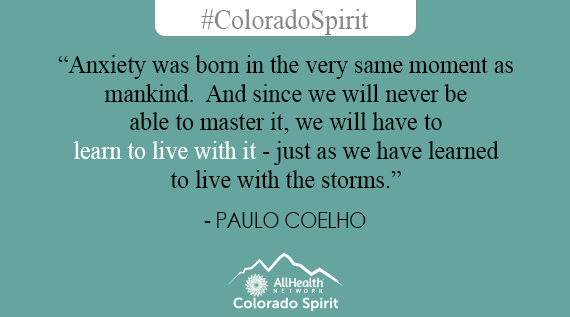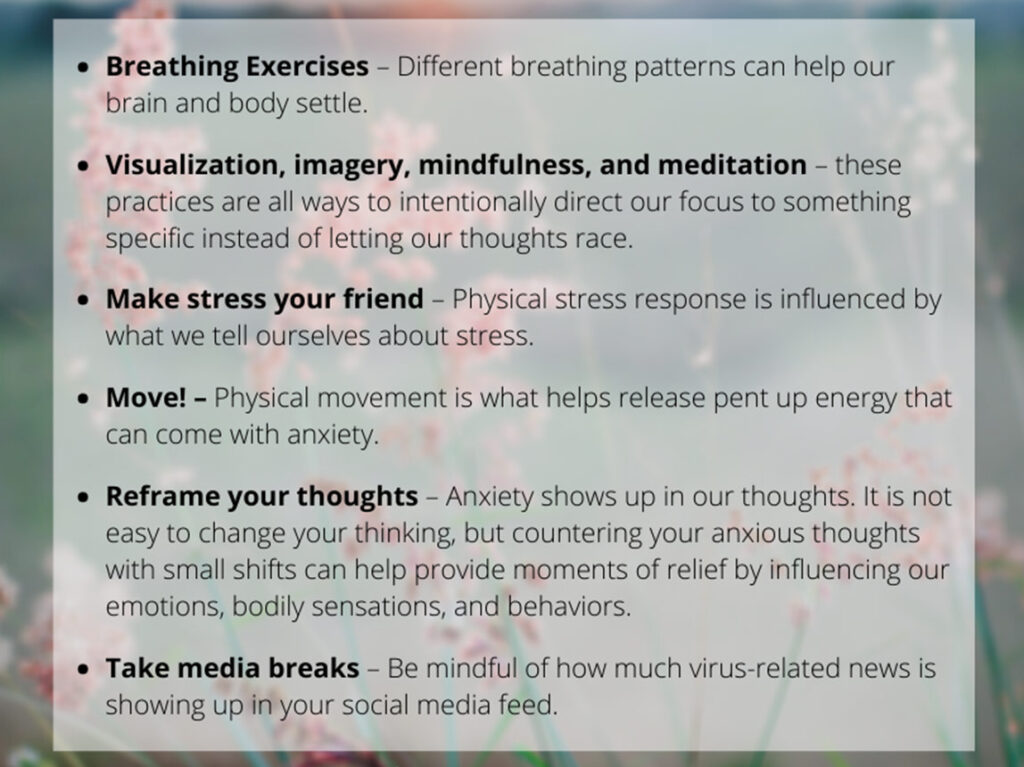There are very few universal truths in life, yet the COVID-19 pandemic might have highlighted one. Anxiety and worry are a part of just about everyone’s life right now. We won’t detail all the things people might feel worried about, but rest assured, if you are worried or anxious, you are NOT alone! At its core, anxiety is fear and there are a lot of unknowns that are creating fear.
Given the dynamic nature of the current situation, there is not anything that will entirely remove our experience of anxiety right now. The trick is identifying tools that help reduce anxiety to manageable levels that work for you in the moment. What that looks like will be different for all of us though.
The good news is there are many concrete strategies that you can try:
- Breathing – this one cannot be overstated. As humans, our breathing patterns change when we are anxious. This sends messages to our brains that we are in danger, which then intensifies our body’s natural stress reaction (think fight-flight-freeze response). The cycle continues and we can get stuck in anxiety. Different breathing patterns can help our brain and body settle.
- Try breathing exercises – paced breathing, boxed breathing, or shape breathing for the little ones.
- Visualization, imagery, mindfulness, and meditation – these practices are all ways to intentionally direct our focus to something specific instead of letting our thoughts race. There are lots of great apps to help guide you through these practices. Some that we like are Headspace, Smiling Mind, and Mindful Gnat. An internet search will reveal many guided practices to help you explore these
- Make stress your friend – Health Psychologist, Dr. Kelly McGonigal presents powerful information about how our physical stress response is influenced by what we tell ourselves about stress. We can’t recommend her powerful TED talk enough!

- Move your body! – For some of us, exercise is the last thing we feel like doing right now. Yet, we know physical movement is what helps release pent up energy that can come with anxiety. It doesn’t matter if you run, walk, stretch, do jumping jacks, or lift weights…the physical action will help the feelings of anxiety
- Reframe your thoughts – Anxiety shows up in our thoughts. We might think about all the bad things that could happen, make detailed yet unrealistic plans for how to avoid various threats, or find ourselves thinking that the struggles we are facing right now will never end. The National Center for PTSD has some wonderful suggestions for re-frames that might help. It is not easy to change your thinking, but countering your anxious thoughts with small shifts can help provide moments of relief by influencing our emotions, bodily sensations, and
- Take media breaks! Many of the attention-grabbing headlines we are bombarded with only increase fear and panic. One of the best protective strategies we suggest is to allow yourself a few times a day to review reputable sources of information and then to shift away from the news. Be mindful of how much virus-related news is showing up in your social media feed too.
Would speaking to someone help?
AllHealth Network, along with other community mental health centers, is continuing to provide services via telehealth and by phone. Our Crisis Walk-in Center remains open 24/7 and offers in-person care to those experiencing a mental health crisis. For more information and to get connected with our services, please call 303-730-8858. To learn more about what other community mental health centers are doing, please visit the Colorado Behavioral Health Council COVID-19 website.
If you are experiencing a mental health crisis and are in need of immediate assistance, please call the Colorado Crisis Hotline at 1-844-493-TALK (8255) or text TALK to 38255
How do you know if you’re experiencing a mental health crisis? Click here to learn about mental health crisis warning signs to look out for from the National Alliance on Mental Illness (NAMI)


